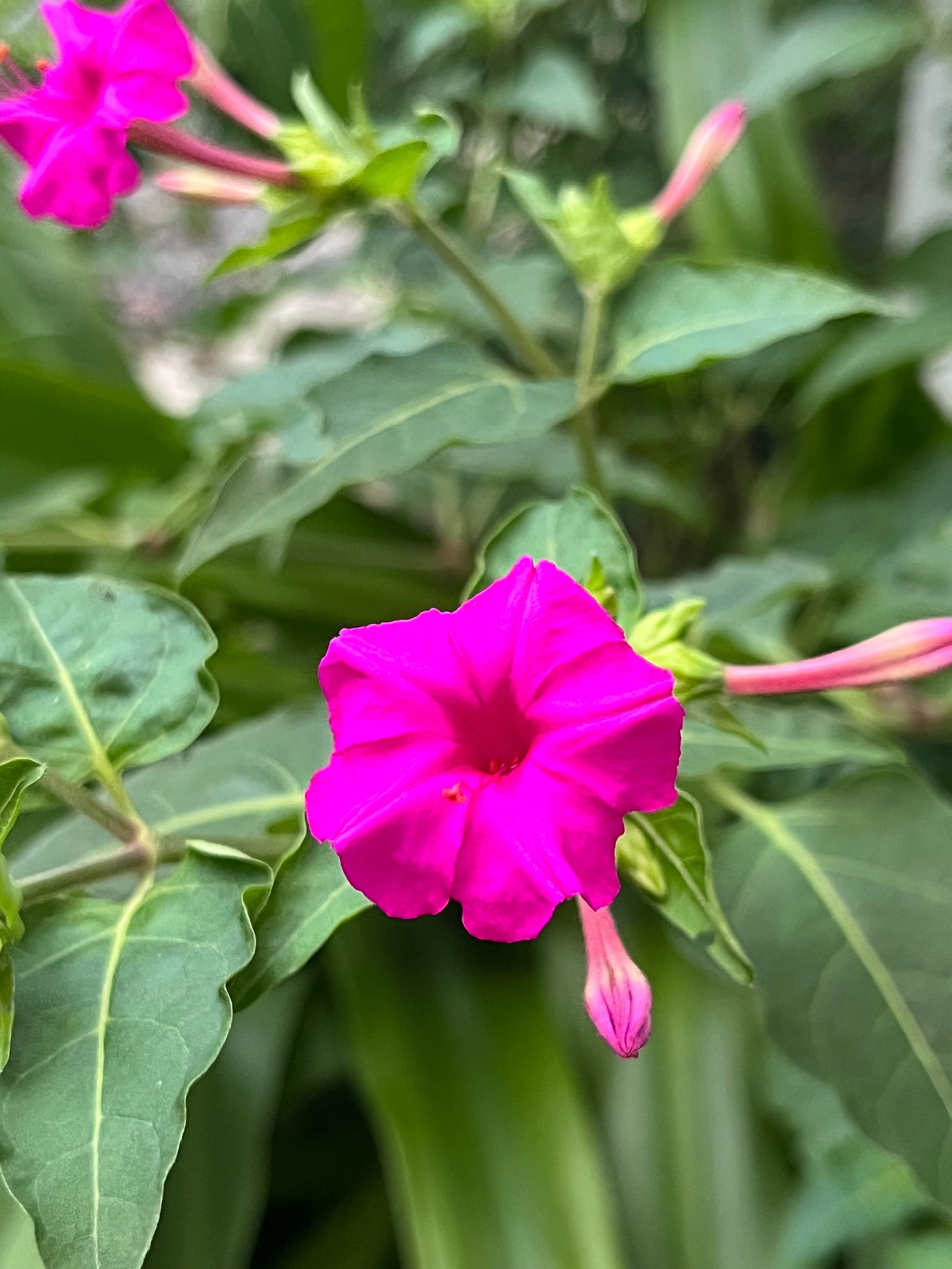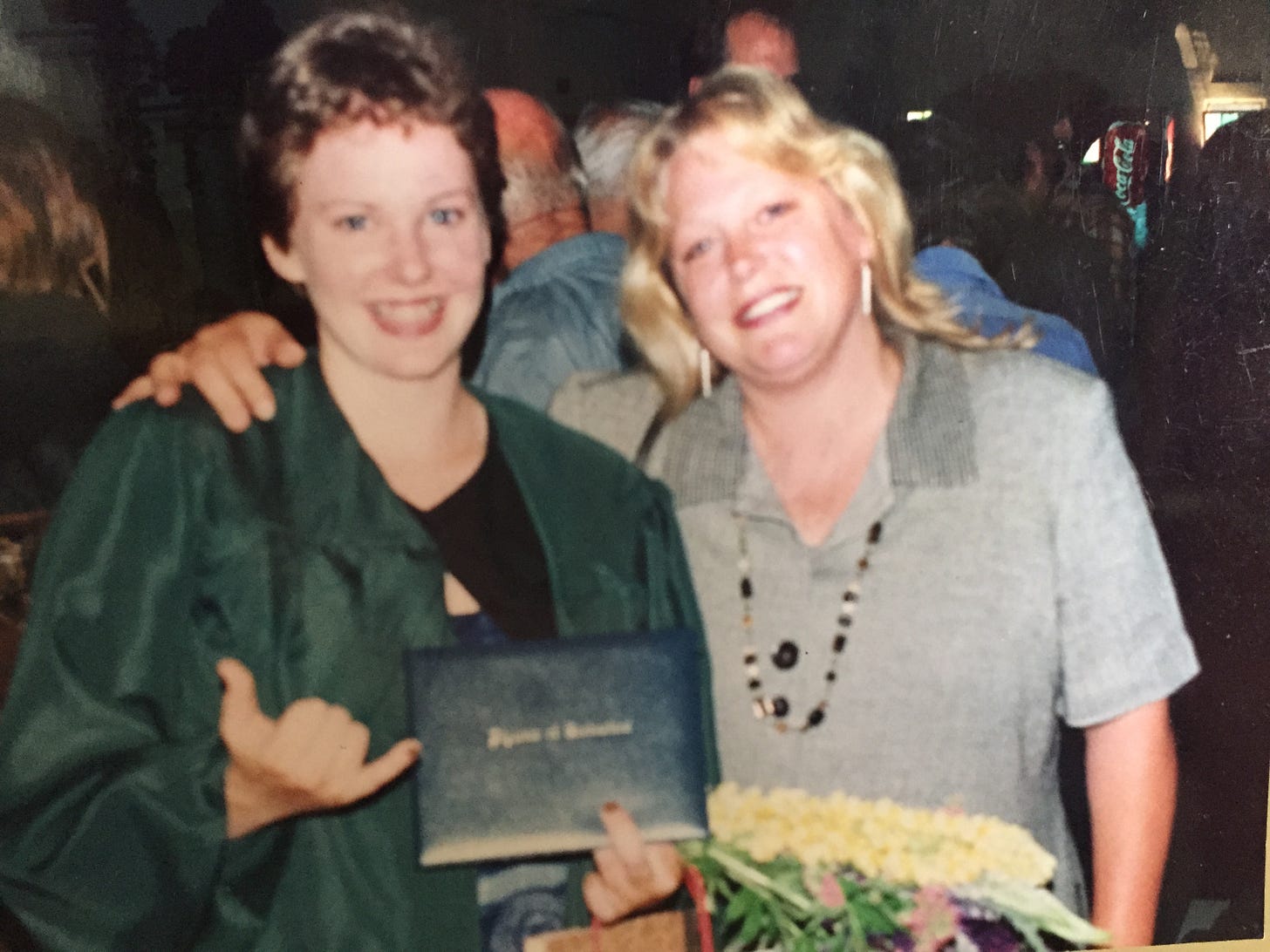(this newsletter discusses child abuse)
The hurricane came through, streaming currents of wind until the tall trees swayed to one melody and the small ones to another. Outside my bedroom window palms fronds sang a song I’d never heard before. The wind was so strong that I closed my blinds so it wouldn’t scare me. Edna crawled under the bedcovers and hid there, as much a comfort to me as I was to her. It was early morning. I slept, waiting for the electricity to cut off. It awoke me when it did. My white noise machine was silenced. The fan above the bed paused. I was grateful that I’d kept the a/c low and reported the outage to the local electricity company.
I was alone during the hurricane but we are never alone now, not with technology. I uploaded several apps back onto my phone and hopped on social media again, just for some company. I streamed Friends on my laptop using my hotspot. The winds passed. No trees fell on my little cottage. All was well.
Before the hurricane I wrote about personal hurricanes, and now that the hurricane has passed and the electricity is restored and my internet is working I am writing here about my personal hurricane and why I have chosen to forgive her over and over. Why we all deserve forgiveness. Why I have forgiven myself over and over.
What is forgiveness but a gift to ourselves? To release ourselves from self-blame, and to free ourselves from being entwined with those who have hurt us?
What is forgiveness but the innate understanding that humans are flawed?
Humans act and react in ways that are harmful; sometimes monstrous. Humans act and react in ways in which they have been taught and conditioned.
Once, after I had finished teaching a Metta meditation class, a student came up to me and said he had an issue with the last part of the meditation. For those who don’t know, Metta is a very powerful meditation technique. It’s also known as Lovingkindness meditation. The practitioner begins the meditation by imagining a creature or human they love without complication. (this is often a creature because there are few humans with whom our love is uncomplicated). They send loving energy to that creature or person. From the first object of love/kindness, the practitioner moves on to someone they don’t know, towards who they have loving and/or neutral feelings, and practices sending love. A better word that “sending” is “cultivating,” I think. Then they cultivate love towards someone close to them, who they love but with whom their relationship is also complicated. Then, they have the option to cultivate love towards someone they’re in conflict with. Then, the entire world.
This practice is not easy as it may sound.
So, at the end of the session, this student came up to me and said he had trouble with the last part. How can we send loving energy to everyone and everything, when evil people exist in the world? What about people who abuse others? People who do evil things?
It’s a valid question. I had to tread lightly, because I am not someone who really believes that any one person is “evil.” I know that’s a contentious belief, but I also don’t believe that we can look at a human as a single organism. Humans grow up within cultures with (often oppressive) belief systems and rules. Humans are raised by parents and communities and also ideologies. Humans are riddled with impulses. And “evil” is a subjective term.
I asked him— by cultivating love towards all beings within himself, was he also giving them permission to commit evil acts?
Who, in the process of cultivating love towards all beings inside oneself, is most affected by that cultivation?
This is why forgiveness is everything to me. Because in forgiving others I am not condoning the ways they have hurt me. Forgiveness isn’t a value statement.
For me, forgiveness is allowing myself to see another person’s humanity. Their struggles. However they hurt me, whether the hurt is profound or superficial, or whether the hurt was intentional or unintentional; that actions (or actions) came from somewhere inside them, and has very little to do with me.
Yesterday, I was writing about my relationship with my mother— someone who hurt and abused me for decades. My mother was also capable of profound love. I loved her deeply, yet after she died, I was freed by her death. That was (and continues to be) an incredibly complicated experience. Her death traumatized me and obliterated me, yet it also liberated me from the pattern of our relationship. Because my relationship with her is ongoing. I will always be in relationship with her. Just because she isn’t alive anymore doesn’t mean I can’t find new ways of understanding our relationship, or forgive her.
In seeing my relationship with my mother clearly, I can also see how, as an adult, I let her have power over me. I opted in to the abusive nature of our relationship, in many ways, because my most comfortable state of being was one of the victim. As a victim of my mother’s abuse, I didn’t have to take full responsibility for my actions. I didn’t have to be a grown-up.
Yet there was no way I could have consciously opted out. I was being who she had taught me to be. She was being who she had been taught to be. Both of us were filled with bitterness, anger, shame, and guilt. Much of her shame and guilt had to do with how she’d raised me. Much of mine were cultivated when I was very young, because I felt responsible for her.
Whenever my mother was confronted with the reality of my childhood, with my vulnerability or any sign of damage stemming from my childhood, she lashed out, and further perpetuated the cycle.
Whenever I sensed that my mother was rejecting my personal experience and my understanding of myself, I shut down and became small. And whenever I shut down and became small, my mom would lash out, making me feel so much smaller, until I would seek solace in unproductive addictions, like bulimia, alcohol, sex, or drugs.
This was how I was taught to be in relationship.
This was what love looked like to me.
Blaming my mother for this would be like blaming the sky for being blue. I know this, because I know my mother’s childhood, and the childhoods of my grandparents, and their parent’s childhoods. Full of struggle, abuse, instability and pain.
I could counter this by saying to myself: but my mother’s siblings didn’t abuse their children like she abused me.
My mother was not her siblings. She was, like I am, a deeply sensitive person who, because of her sensitivity, was often the scapegoat. She was the youngest girl, who watched her older sister’s ostracizing at the age of 16 for getting pregnant. She was an idealist. She was smart as a tack, but a high-school dropout. She had everything to prove. She had me too young, and I held her back in many ways. That in itself created a deep conflict within her.
My therapist has confirmed for me that my mom didn’t appear to have a maternal instinct. That her abuse was real. That is shaped me and fragmented me profoundly. That some of the abuse appeared careless, and some intentionally harmful.
Knowing that my mother consciously wanted to hurt me, I can still forgive her.
I know that her urge to hurt me was also an urge to hurt herself, and that in hurting me she also hurt herself.
I know the pain she carried inside, because I carry it too.
I can forgive her.
I can be consumed by rage and sadness.
I can forgive her.
I can be consumed by guilt and shame.
I can forgive her.
I can forgive myself.
I can forgive and let go, again and again.
In forgiving and letting go I find freedom.
Freedom to see myself and others clearly.
If I choose not to forgive, I will always pay a price for it. When we are uncaring, when we lack compassion, when we are unforgiving, we don’t just suffer alone for that choice. Our family suffers, our community suffers, and ultimately our entire world suffers. We are made to exist in a delicate network of interdependence. We are sisters and brothers, whether we like it or not. To treat anyone as if they were less than human, less than a brother or a sister, no matter what they have done, is to contravene the very laws of our humanity. And those who shred the web of interconnectedness cannot escape the consequences of their actions . . .
-Desmond Tutu







This is so beautiful. Thank you for writing it.